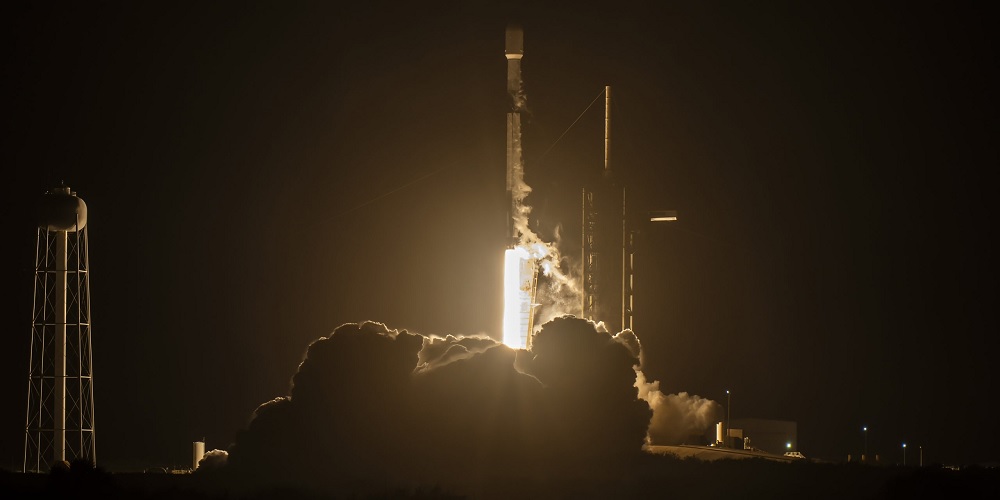User Rating: 5 / 5
The powerful Falcon 9 rocket of the American space company SpaceX successfully launched two European Galileo navigation satellites into orbit on April 27, 2024, in a launch that was unusual in several respects. The Falcon 9 rocket lifted off from Kennedy Space Center's Launch Complex 39A carrying the Galileo GM25 and FM27 satellites. Unlike 146 previous Falcon 9 launches, the lower stage of the Falcon 9 rocket did not return to Earth.
The European Union Space Program Agency, or EUSPA, the EU agency that handles Galileo operations, confirmed several hours later that the satellites were in orbit and operational. The launch was carried out with a degree of secrecy usually reserved for covert launches related to national security. SpaceX did not provide video footage of the launch after the stage separated and ended the webcast after confirming the cargo parachute had separated. The company waited for the client to get further updates about the mission.
It is not clear why the secrecy increased. Previous launches of Galileo satellites on Ariane and Soyuz rockets from French Guiana have received more attention, as have Falcon 9 launches of Galileo's American counterpart, the Global Positioning System. Neither the European Commission nor the European Space Agency (ESA) announced the launch in advance. In their statements after the successful launch, European officials deliberately avoided mentioning how the satellites were launched.
“Two new Galileo satellites were successfully launched last night,” Thierry Breton, the EU Internal Market Commissioner, posted on social media on April 28. “Waiting for Ariane6, launches in 2024 are critical for the flexibility, robustness and sustainability of Galileo’s civilian and military applications.” This explanation was the closest to recognition for the reason for launching satellites on a Falcon 9 rocket. The retirement of the European Ariane 5 rocket, the loss of access to the Soyuz rocket in the wake of the Russian invasion of Ukraine more than two years ago, and the delay in the Ariane 6 launch, left Europe without its own launch vehicle. For Galileo satellites, this is the situation established by the European Space Agency. General Manager Joseph Aschbacher described it as a “launch crisis.”
Breton said in November 2023 that the European Commission was finalizing a deal with SpaceX to launch two Falcon 9 rockets, each carrying two Galileo satellites, scheduled for launch in 2024. He added that this contract was worth 180 million euros ($193 million). ). The launch was the second European Enterprise mission to fly on a US Falcon 9 rocket due to the ongoing launch crisis, following the launch of the European Space Agency's Euclid Space Telescope in July 2023. Another pair of Galileo satellites will be launched later this year aboard Falcon 9 rocket, along with separate Falcon 9 launches from ESA's EarthCARE Earth science mission and the Hera asteroid mission.
For SpaceX, this launch marks the 20th flight of this booster, matching another booster that launched a batch of Starlink satellites earlier this month. The booster has previously launched missions ranging from a GPS satellite and Intuitive Machines' IM-1 lunar lander to 13 constellations of Starlink satellites. The launch was also the final mission for this booster, designed B1060. SpaceX said the additional performance required to launch Galileo satellites into medium Earth orbit meant the booster could not be recovered. It broke a streak of 146 Falcon 9 launches with booster landings dating back to November 2022, when SpaceX conducted back-to-back Falcon 9 launches with geostationary satellites that had exhausted their boosters.
The company said after the launch: “We are working to qualify our fleet of Falcon boosters and hydrofoils to support 40 missions each,” noting that this launch is the 200th that uses previously launched hydrofoils.
source: Space news

“Total coffee specialist. Hardcore reader. Incurable music scholar. Web guru. Freelance troublemaker. Problem solver. Travel trailblazer.”







More Stories
GALA lacks a chapter on e-health
Weird beer can taste really good.
Planets contain much more water than previously thought